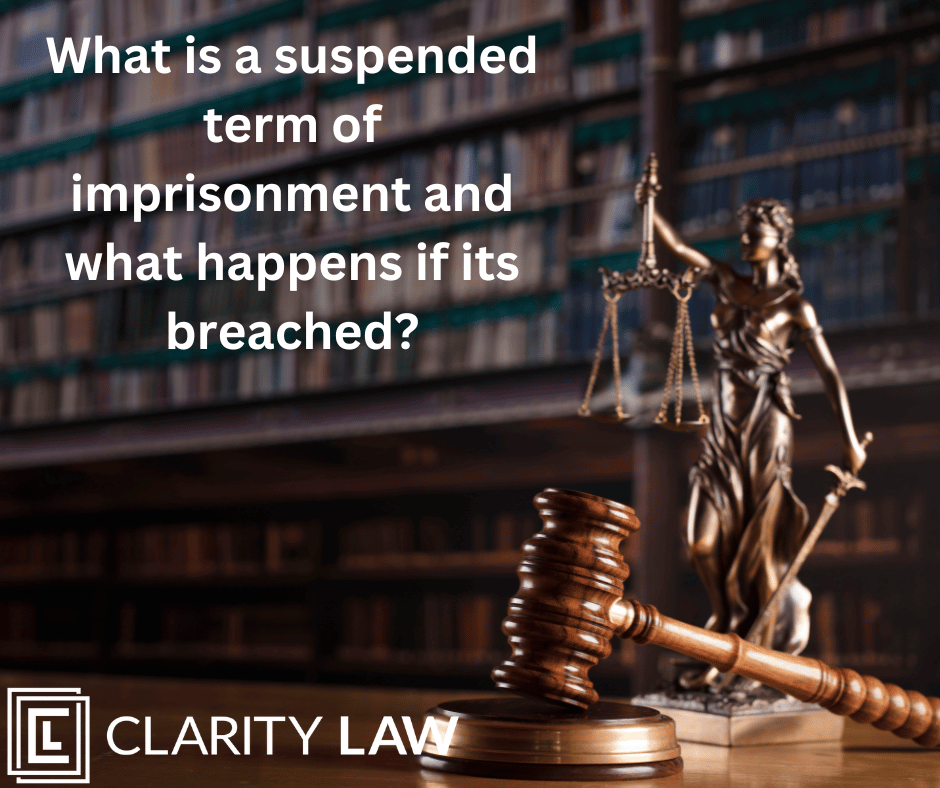
For criminal and traffic cases, the Queensland courts have multiple sentencing options at their disposal.
This article will concentrate on suspended sentences of imprisonment.
What is a Suspended Term of Imprisonment?
Somewhat artificially, a suspended term of imprisonment (sometimes called a ‘suspended sentence’) is a term of imprisonment wholly or partially served in the community. For example, a person can be sentenced to a term of imprisonment of 12 months, suspended after three months, with an operational period of two years. This would mean that the person served three months in custody and nine months are then still ‘hanging over his head’ for two years after that. If he was to be convicted of an offence ‘punishable by imprisonment’ within those two years, he would then be dealt with for the ‘breaching’ offence and after that, sentenced for breaching the suspended term of imprisonment.
Once the suspended sentence is breached, the court has a few legislated options available to it, according to section 147 of the Penalties and Sentences Act.
The first, and default, option is to order the person to serve the whole of the remaining part of the suspended term of imprisonment. That is, using our above example, nine months imprisonment.
The second option is to order the person to serve part of the outstanding suspended term of imprisonment, such as four of the remaining nine months.
The third option is to extend the ‘operational period’ of the suspended sentence. So, again using our example, the two years operational period might be extended for another two months, adding two months to the remaining operational period.
Options two and three are only available when the Judge or Magistrate decides it would be “unjust” to require the person to serve the whole of the remaining period of suspended imprisonment.
There is a legal test to assist the Court in deciding whether it would be unjust to require the person to serve the whole of the remaining period of suspended imprisonment:
“The court must have regard to—
(a) whether the subsequent offence is trivial having regard to—
(i) the nature of the offence and the circumstances in which it was committed; and
(ii) the proportion between the culpability of the offender for the subsequent offence and the consequence of activating the whole of the suspended imprisonment; and
(iii) the antecedents and any criminal history of the offender; and
(iv) the prevalence of the original and subsequent offences; and
(v) anything that satisfies the court that the prisoner has made a genuine effort at rehabilitation since the original sentence was imposed, including, for example—
(A) the relative length of any period of good behaviour during the operational period; and
(B) community service performed; and
(C) fines, compensation or restitution paid; and
(D) anything mentioned in a pre-sentence report; and
(vi) the degree to which the offender has reverted to criminal conduct of any kind; and
(vii) the motivation for the subsequent offence; and
(b) the seriousness of the original offence, including any physical or emotional harm done to a victim and any damage, injury or loss caused by the offender; and
(c) any special circumstance arising since the original sentence was imposed that makes it unjust to impose the whole of the term of suspended imprisonment.”
A Scenario
Clarity Law had a client[1] who was sentenced in the District Court for violence offences. He was sentenced to 18 months imprisonment, suspended after four months, with an operational period of three years. That is, he served four months in custody before he was released from jail to serve the rest of his sentence in the community.
Then, about nine months into the District Court suspended sentence, he committed a shop steal offence, taking a bottle of alcohol valued less than $40. He was fined in the Magistrates Court for that offence. The law then required him to be committed to the District Court to be dealt with for the breach of suspended sentence. The District Court decided to extend the operational period of his suspended sentence, noting the offence was of a different type from the original offences and was far less serious, and it would be unjust to require him to serve any time in custody.
About two months, later he committed more offences of violence; he was charged with common assault for a punch and charged with a beach of domestic violence order. Thanks to our skilful negotiations, we were able to get the common assault withdrawn and the facts of the DVO breach changed to a push. In the Magistrates Court he was sentenced to nine months’ probation. He was then committed to the District Court to be dealt with for breaching his suspended sentence.
In the District Court, the Judge commented he was ‘skating on thin ice’. Ultimately, the judge decided to activate the remaining portion of the suspended term of imprisonment, but then place the client on immediate parole. This meant that he had 14 months to perform on parole, or risk being sent to custody by the authorities. That is, he did not have to commit another offence to risk having his parole cancelled, as the parole board has the authority to suspend or cancel his parole if he has failed to comply with the parole order.
Although it may not be obvious from the scenario described above, our client was actually very fortunate that he was not required to serve any additional time in custody.
Conclusion
As can be seen, dealing with a suspended sentence can be complicated, particularly if it is imposed by a higher court and then breached by offences dealt with in the Magistrates Court. We highly recommend getting expert legal advice if you find yourself in such a position.
[1] We have changed the details to maintain client confidentiality.






